by Hanna Roberts | Mar 2, 2018 | Alumni Spotlight, Outcomes, Uncategorized
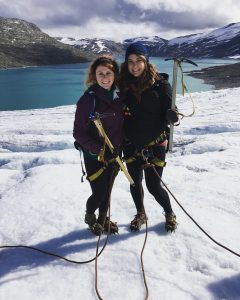
Allison (left) in Norway with her college roommate.
Allison Phillips graduated from the College of Business in 2015 with a marketing degree. She is currently working for Deloitte Consulting as a Data Scientist for clients and lives in Denver, Colorado. She is also passionate about traveling and her job allows her to pursue that.
Q: How have your foundations at ACU and in COBA helped you in life post-graduation?
A: During my time in COBA, I had the chance to lead student organizations, conduct research with faculty, and launch a student-run analytics consultancy through Wildcat Ventures. These experiences gave me the chance to gain experience as a researcher and consultant really early in life, which made my transition from school to work much easier. Professional skills aside, COBA gave me a lengthy list of mentors who guided and supported me as I tried to figure out the career direction I wanted to pursue. Having adults in my life who listened and gave me honest opinions about the decisions I was making has had a huge impact on the way I make decisions in my personal and professional life.
Q: Can you describe your work in data analytics and the experiences you’ve had with your company?
A: I’m currently a Data Scientist in Deloitte’s Consulting practice, which allows me to work with different clients to understand what has happened, predict what will happen in the future, and make more effective decisions with that information. I’ve gotten to work with companies as well as federal agencies, and I enjoy the challenge of learning about new industries and continuing to develop my technical skills while solving a wide variety of business challenges. In a given week, I work with teammates from all across the country to write code, conduct statistical analysis, design experiments, build slides, and brief clients. I’ve met some really incredible people at Deloitte, and it’s been fun to work with teammates whose backgrounds are very different than mine.
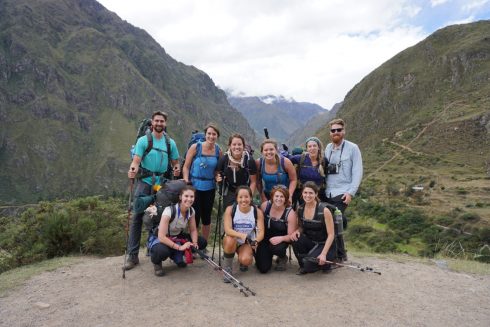
Allison with friends hiking Machu Picchu in Peru.
Q: What should students who are interested in data analytics be doing while they are in school to prepare for that after graduation?
A: Students interested in analytics should take data mining and programming classes to understand if they enjoy the kind of work they would be doing as a data scientist. Outside of class, students should look for relevant internships, opportunities to conduct research with faculty or job openings at ARG (the analytics piece of Wildcat Ventures). A lot of different paths lead to analytics careers so I would recommend learning some basic technical skills and looking for opportunities to apply those in ways that interest you.
Q: Would you share some of your favorite memories or experiences of traveling? How do you balance that with work?
A: I love traveling and definitely take advantage of all my time off! One of my goals is to visit all 59 National Parks, so I spend a lot of weekends hiking and camping with friends. Last year I also hiked to Machu Picchu with a big group of friends, road tripped through Norway with my college roommate (where we tried to break into a house that turned out not to be our AirBnB), and traveled through Southeast Asia with my family, where we ziplined to the tallest treehouses in the world. Learning about different cultures and experiencing ways of life that are different than mine is really important to me, and I’ve been lucky to have colleagues who are supportive of that. Plus it’s super fun!
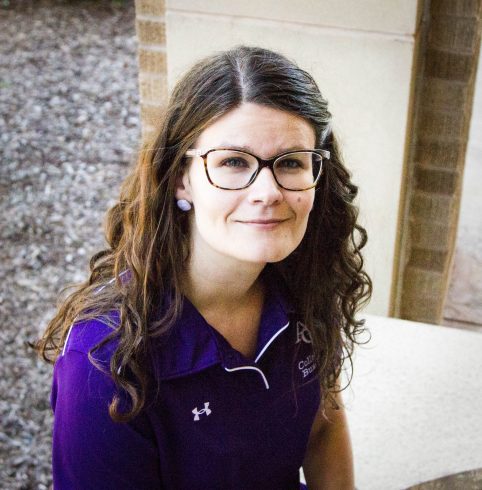
by Hanna Roberts | Feb 23, 2018 | Academics, COBA Faculty, Poverty and Development, Research, Social Entrepreneurship, Uncategorized
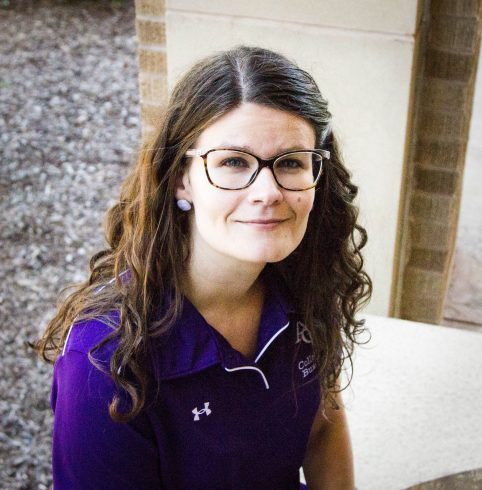
Dr. Sarah Easter is a professor in the College of Business Administration and teaches classes like Strategic Management, Business and Sustainability, and International Business.
Over the summer, Dr. Sarah Easter attended the Academy of Management (AOM) Annual Meeting: a professional association for over 10,000 management and organization scholars whose mission is to build a vibrant and supportive community of scholars by markedly expanding opportunities to connect and explore ideas. The theme of this year’s AOM Annual Meeting was ‘Improving Lives’ and specifically focused on how organizations can contribute to the betterment of society through elevating the health and well-being of those who live in it. In her dissertation research, Dr. Easter conducted a sixteen-month ethnographic study of a coalition to end homelessness in Western Canada. The coalition involved over forty different governmental, business and nonprofit players and she examined how they worked together toward common goals while considering many different perspectives. Dr. Easter presented a paper over one of the key findings of this research and received the Best Paper Award based on a Dissertation from the Managerial and Organizational Cognition Division of the Academy of Management.
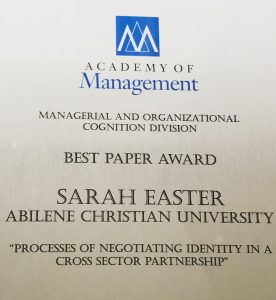
Dr. Sarah Easter was presented with the Best Paper Award for processes of negotiating identity in a cross-sector partnership.
Dr. Easter’s dissertation research centered on the challenge of the coalition: developing a cohesive and unified identity (i.e., its focal purpose and goals) in the face of a variety of different perspectives. Those involved in the coalition had many different viewpoints on what the central issue they were working to address entailed, which was homelessness. Even though all participants talked about the notion that the overall vision to end homelessness was well understood by all involved, the result was that the partnership was often pulled in multiple directions simultaneously. The findings speak to the importance of such collaborative partnerships as being very explicit in terms of the vision they are working to achieve. This involves having ongoing discussions and check-in points to ensure that all players are able to clearly articulate the direction of the partnership, including underlying meanings of terms utilized, particularly as participants are continually cycling in and out. Dr. Easter was fascinated in learning how a diverse body of organizations and individuals from public, private and nonprofit sectors come together to address a significant societal issue over time and was able to develop a deep understanding as to how the coalition evolved over time in the presence of many and very different ways of working.
Dr. Easter took special notice of the pull between both opportunities and challenges that organizations face in carrying out their work while conducting her research. This is something she emphasizes while teaching classes like Strategic Management, Business and Sustainability, and International Business. “I believe strongly that it is important to consider both dimensions in order to develop a more holistic perspective of a given organization’s current situation,” Dr. Easter emphasized. “I bring up this example in my courses: an organization that has incredible potential to make an impact in addressing homelessness in the local region (opportunity). At the same time, though, there are incredible challenges associated with this complex structure.” Dr. Easter continues a passion for studying how people work across cultural and socioeconomic structures especially through addressing major societal challenges and looks for ways to connect with people and organizations as well as share this passion with her students in the classroom.
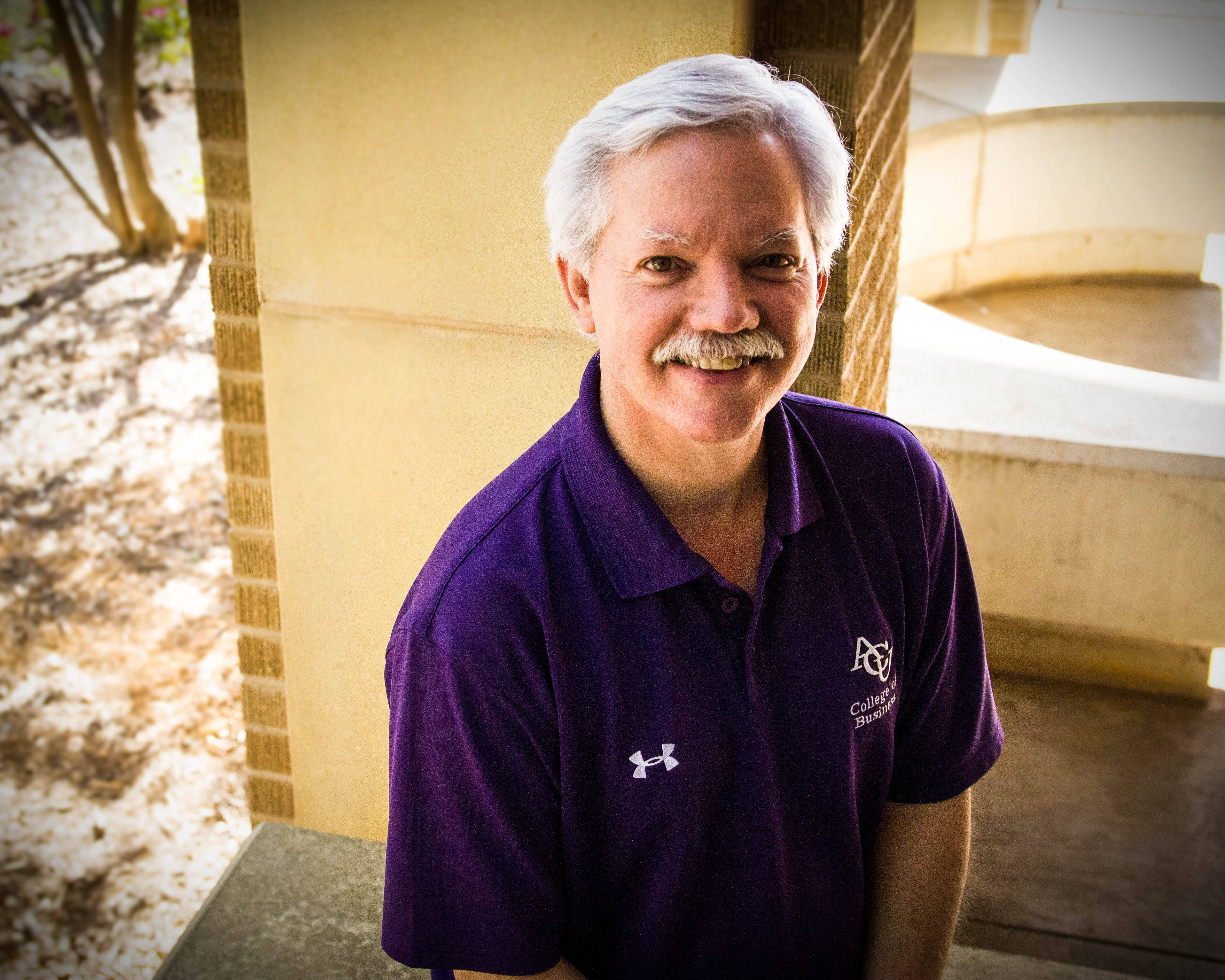
by Hanna Roberts | Nov 6, 2017 | Academics, CCCU, COBA Faculty, Uncategorized
When you walk into Dr. Monty Lynn’s office, you are struck with a sense of peace and quiet and are greeted with a warm handshake and an even warmer smile. Talking with him, you get the sense that you are heard and paid attention to, that everything said in that room is important to him. Recently, Dr. Lynn was honored with the Christian Business Faculty Association’s Teaching Award. Once a year, business faculties in a network of 110 faith-based schools meet to share ideas about teaching and research and to honor outstanding members in the CBFA. The CBFA Teaching Award was established by the Christian Business Faculty Association to perpetuate Christ-like teaching and to recognize Christian business faculty members who emulate the character, engagement, and calling of Christ to the work and ministry of transformational education. These are all certainly descriptors of Monty Lynn and we could not think of a more fitting person to receive this award.
Dr. Lynn is held in very high esteem by his peers and students. Mark Phillips, Professor and Management Sciences Department Chair, describes Dr. Lynn as the ‘face’ of COBA to many generations of new business students, as they begin their academic career in Dr. Lynn’s Intro to Business course. Phillips recalls students describing Dr. Lynn as incredibly, unbelievably nice, which made it all the more shocking when they learned that he gives such hard exams. “Everything he does is  accomplished with excellence and grace,” says Phillips. “Monty exemplifies the type of faculty member we try to hire and retain.” Dr. Lynn treats everyone with the utmost respect; you are always given his undivided attention and he is very intentional in the curriculums that he teaches and the advice that he gives. He teaches business in a context that reflects how one can use their skills to benefit others and to be a selfless person in the world. Dr. Lynn invests in his students. He is gifted in his ability to leave a lasting impression on those who encounter his words of wisdom. While teaching students the fundamentals of business, he is also instilling in future generations how to combat the challenges of this world with an empathetic heart and a servant’s mentality. Elisabeth Danelski, a junior finance major, and Dr. Lynn’s student worker, said that Dr. Lynn is one of the biggest blessings she has received in her time here at ACU. “Now he is not only my mentor but someone who I share my daily stories with. I come to him when I’m at my wits end seeking advice and most importantly, someone who I hope to have in my life long after I graduate,” she said. “I am so excited the humblest person I know is receiving recognition for the dedication and passion he brings to his field in such a Christ-like manner.”
accomplished with excellence and grace,” says Phillips. “Monty exemplifies the type of faculty member we try to hire and retain.” Dr. Lynn treats everyone with the utmost respect; you are always given his undivided attention and he is very intentional in the curriculums that he teaches and the advice that he gives. He teaches business in a context that reflects how one can use their skills to benefit others and to be a selfless person in the world. Dr. Lynn invests in his students. He is gifted in his ability to leave a lasting impression on those who encounter his words of wisdom. While teaching students the fundamentals of business, he is also instilling in future generations how to combat the challenges of this world with an empathetic heart and a servant’s mentality. Elisabeth Danelski, a junior finance major, and Dr. Lynn’s student worker, said that Dr. Lynn is one of the biggest blessings she has received in her time here at ACU. “Now he is not only my mentor but someone who I share my daily stories with. I come to him when I’m at my wits end seeking advice and most importantly, someone who I hope to have in my life long after I graduate,” she said. “I am so excited the humblest person I know is receiving recognition for the dedication and passion he brings to his field in such a Christ-like manner.”
It is clear how others see Dr. Lynn – gracious, intentional, and Christ-like. Dr. Lynn says that he always imagines himself as a student when he teaches a class and asks himself what he would want to learn, what he would be curious about, and what he would need to know. Dr. Lynn said that no class of his is ever the same. “I always tweak my classes every semester,” he said. “You have to change because things change in business constantly; there are always new examples, insights, and experiences.” Dr. Lynn’s engagement with his students is evident in this way; he makes every semester better and more relevant to that specific group of students so that they can learn and grow in the specific ways they need. His intentionality with students makes him beloved. Dr. Lynn’s commitment to lifelong learning also contributes to his status as an excellent teacher. It says something when a teacher is more eager to learn than they are to teach and his love for learning shows in the way he carries himself in the classroom. He treats every day as an opportunity to gain a new perspective and to allow the experiences of others to change the way he sees this world. We could not be more proud to call Dr. Lynn one of our own and are excited to see how he continues to teach and impact every student that walks into his classroom.
by Hanna Roberts | Nov 1, 2017 | Uncategorized
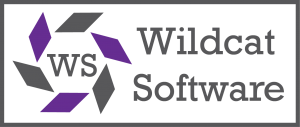
In 2014, Wildcat Software was started as part of the Griggs Center’s Wildcat Ventures, a program where students create and run their own small business. Wildcat Software provides software development to clients. Employees of Wildcat Software are generally technology students – students with majors such as Computer Science, Information Technology, Digital Entertainment Technology, and Management Information Systems – and are given access to cutting edge technology to produce high quality work at a reasonable rate. Student developers take the requirements they receive from clients and build out the software to meet their demands. They break down tasks step by step and are in charge of meeting with the client throughout the process to ensure that the software is what the client wants. The overall goal of Wildcat Software is to provide custom software solutions to a wide range of clients, which include small local business as well as larger corporations and banks across the nation.
One of Wildcat Software’s most recent projects was developing an app for ACU Theatre. The ACU Theatre Department contacted Wildcat Software through the library’s Innovation Foundry, wanting a mobile platform that would help audiences look for shows as well as allow for mobile ticket sales. They also wanted users to be able to view showtimes for the current season and purchase tickets not just for a single show, but for the entire season. Colin Blanchard and Holly Buff, two senior developers at the company, and Gideon Luck, project manager, were the Wildcat Software employees assigned to this project. The WS team met with the client to get an idea of what they wanted and then began to build mock-ups, outlining the basic form of the app with wireframes so that the client could get a feel for what it would look like. After approval by ACU Theatre, the actual development began. The development team used PhoneGap with cross-platform HTML and Java, which allowed the app to work on both iPhones and Androids. In PhoneGap, developers tested the app, deployed it to a device, wrote the native code, and built the app into devices which were then brought to the client. The app was published to the App Store and Google Play in August. The ACU Theatre app was tested and ready in time to make ACU Theatre’s Homecoming production of Cats easy and accessible for students, alumni, and theatre lovers. You can download ACU Theatre in the App Store or Google Play for free today! (App Store:https://itunes.apple.com/us/app/acu-theatre/id1270835292?mt=8, Google Play:https://play.google.com/store/apps/details?id=com.acutheatre.app&hl=en)
assigned to this project. The WS team met with the client to get an idea of what they wanted and then began to build mock-ups, outlining the basic form of the app with wireframes so that the client could get a feel for what it would look like. After approval by ACU Theatre, the actual development began. The development team used PhoneGap with cross-platform HTML and Java, which allowed the app to work on both iPhones and Androids. In PhoneGap, developers tested the app, deployed it to a device, wrote the native code, and built the app into devices which were then brought to the client. The app was published to the App Store and Google Play in August. The ACU Theatre app was tested and ready in time to make ACU Theatre’s Homecoming production of Cats easy and accessible for students, alumni, and theatre lovers. You can download ACU Theatre in the App Store or Google Play for free today! (App Store:https://itunes.apple.com/us/app/acu-theatre/id1270835292?mt=8, Google Play:https://play.google.com/store/apps/details?id=com.acutheatre.app&hl=en)
Working for Wildcat Software gives student employees the skills and experience necessary for their future careers. Additionally, student employees get to see beyond the technical aspects of their job and learn how a business operates. Colin Blanchard, Senior Developer, said “it is very interesting working for a company run by my peers. I get to be more involved in the client and business side.” Blanchard noted that his favorite project with the company was building their own website. “It was fun because it was for us and by us, we got to make it what we wanted.” Virginia Pettit, Senior Developer, has also enjoyed her time as a student employee of Wildcat Software. She explained that the command structure is much more laidback because of the student-run aspect of the company, but thinks that there is a bigger sense of pride and accomplishment when they achieve things since they are students and it feels more like a team than a corporate environment. Pettit says she loves learning new things in her job and being able to teach them to others. “When we worked on making our own website, I got to mentor junior developers and teach them a lot about the job and working with web technologies,” she said. “I have input on big decisions and I know my opinion matters.”
Wildcat Software is constantly growing in numbers of employees and clients. Soon the company will be moving into their own office down the hall from the Griggs Center, which will help to establish the company and give them even more tools they need to continue doing excellent work. If you would like to learn more about Wildcat Software, you can visit their website at http://wildcatsoftware.net. At the moment, they are looking for someone to replace their current CEO, Nik Grau, who will graduate soon. If you are interested, apply today under the ‘Join Our Team’ tab on their website and email a resume and cover letter to Nik Grau at nrg13a@acu.edu. This position is a non-technical position and no technical experience is required. If you have any questions, email Brandon DeLano at bcd13a@acu.edu or stop by his office MBB 256.

by Hanna Roberts | Oct 23, 2017 | Academics, Current Students, Human Resource Management, Uncategorized
Last week, eleven COBA students attended the HRSouthwest Conference (HRSWC) in Fort Worth, TX. The HRSWC is the largest regional educational and networking event for human resource professionals. HRSWC is organized by DallasHR, the Dallas-based SHRM Affiliate Chapter. More than 2,500 HR professionals attended the conference and had the opportunity to hear from keynote speakers Laura Bush and John O’Leary, attend educational sessions, and connect with other professionals as well as experience new ideas and technology in the HRSWC Marketplace.
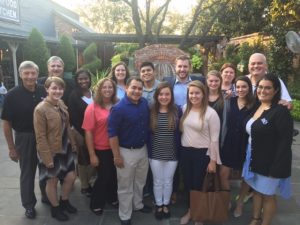
Dr. Malcom Coco, Dr. Phil Vardiman, and students at the HRSWC.
Society of Human Resource Management Sponsor Dr. Malcom Coco said the conference “was an awesome opportunity for the eleven attending students to meet and network with the conference attendees”. This conference provided an opportunity for the students to learn more about their discipline. It also helped them to determine if they wanted to go into the HR field, what part of the field interested them, and gave them an opportunity to meet hundreds of HR professionals to expand their individual network for possible future jobs.
Tom Harris, a senior management major and full-time manager at The Men’s Wearhouse, was encouraged by Dr. Phil Vardiman to attend the conference so that he could connect with HR professionals. Harris said that his conversation with Linda Swindling was the standout of his conference experience. Swindling is a Certified Speaking Professional, “Recovering Attorney,” the past-president of the National Speaker Association, the current President of Journey On!, her own speaking and consulting company, and the author of more than 20 books. Harris talked with her at length before Swindling’s presentation about her history and experiences and was even called on stage during her presentation to share a few words. Harris said that the most helpful thing he learned at the conference was the importance of being intentional. Their full schedules during the conference required some creativity on his part so that he could connect with people. “If someone I wanted to talk to was in a hurry to get to a speaking session, I would try my best to be in a hurry with them,” he said. “Have your main course at one table, meet everyone that is sitting near you, shake their hands, and go get your dessert and do the same thing at a different table.” Harris believes that it is important to take advantage of every possible networking opportunity and felt that the HRSWC allowed him to do this and to practice his networking skills.
by Hanna Roberts | Sep 18, 2017 | Academics, COBA Events, Poverty and Development, Social Entrepreneurship, Student Spotlights, Uncategorized
Casey McMullin is a senior financial management major from Colorado Springs, Colorado. This summer, Casey traveled around the world interning and studying abroad. He visited countries in Africa and Asia. Casey returned to Abilene with a changed perspective, new skills, and many stories.
Q: Where did you go and what did you do in Africa?
A: I went to Arusha, Tanzania. It was two hours from Mt. Kilimanjaro, which was amazing to see every morning when we woke up. We were based at Neema Village, where they house 40 babies and at-risk or abandoned children. I helped start a microfinance program so that local mothers can start businesses for additional income.
-

-
Casey with children in Neema Village
-

-
Casey with a child in Tanzania.
Q: Did working with microfinance in Tanzania change your perspective on business?
A: I think that the most challenging part was the difference between Tanzanian and American business and legal environments. When we were building the microfinance program, we had to do everything in accordance with American not-for-profit laws and Tanzanian laws so that they could get loans. A better understanding of business law would have helped.
The nature of business was very different in Tanzania. It was very simple. I had to go back to the foundations and teach the locals so that they could understand what we were doing. At the same time, I had to maintain the financial complexities I had learned so as to ensure that the program would function properly and long past our departure.
Q: What was the most impactful interaction you had with a local?
A: I think that the coolest thing that happened to me happened at the very end of our time in Africa. We only did one test run of a business since it took a long time to set up. We were working with a woman who started a chicken business. We helped her get funding for a bigger coop, food, and medicine for the chickens. On our last day, we were saying goodbye and hugging her. She gave us eggs and then ran to chop down her whole sugar cane. We told her not to, but she cut it down regardless and gave it to us as a thank you.
-

-
Casey and Lexi Koon, junior, with the woman who started a chicken business.
-
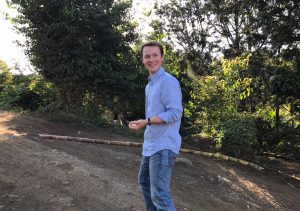
-
Casey with the sugar cane that the woman gave in gratitude.
Q: Where did you go and what did you do in China?
A: We were based in Shanghai and also traveled to Beijing and Hong Kong on the weekends. I took a crash course in basic principles of entrepreneurship and Chinese principles of entrepreneurship. We examined
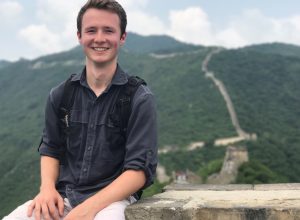
Casey sitting on the Great Wall of China.
the different opportunities to and ways of starting a company in China, visited start-ups, and talked with a number of entrepreneurs, both natives, and expatriates.
Q: What was different about studying business in another country?
A: One thing that struck me was the sheer size of China. The massive populations changed the way they did business in ways I didn’t think about. It was also interesting to see similar priorities between us as well as what each country values more. For example, the Chinese emphasize education starting at a young age and it was interesting to see how that affected business and the way people were.
Q: Did you have a big culture shock moment?
A: Oh yeah. After spending 8 weeks in Africa where there are no Chinese people, we were shocked as soon as we stepped off the plane. There were so many people walking around and they all seemed so busy. There was a class of 30 kids running around and yelling at each other in Chinese and the only thing we could think was “we are in China.”
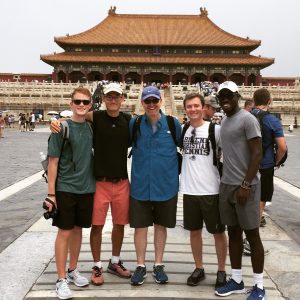
Nicholas Weirzbach, Steven Yang, Dr. Andrew Little, Casey, and Jack Oduro smile in front of the Forbidden City.
Q: Compared to interning, how was study abroad different when it came to cultural immersion?
A: In Africa, I felt like I needed to immerse myself a lot more. I think that this was because I was there to help other people rather than studying for my own benefit. Being there for others drove me to learn the language and immerse myself more since I was not there for myself.
Q: Overall, what was your biggest takeaway from this summer?
A: Take any risk. This summer, I saw just how much people live with nothing. I think that the fear of losing something can hold people back, but that is a mindset that you just can’t live with. You should be doing what you love. Look for an outcome rather than a consequence.






 accomplished with excellence and grace,” says Phillips. “Monty exemplifies the type of faculty member we try to hire and retain.” Dr. Lynn treats everyone with the utmost respect; you are always given his undivided attention and he is very intentional in the curriculums that he teaches and the advice that he gives. He teaches business in a context that reflects how one can use their skills to benefit others and to be a selfless person in the world. Dr. Lynn invests in his students. He is gifted in his ability to leave a lasting impression on those who encounter his words of wisdom. While teaching students the fundamentals of business, he is also instilling in future generations how to combat the challenges of this world with an empathetic heart and a servant’s mentality. Elisabeth Danelski, a junior finance major, and Dr. Lynn’s student worker, said that Dr. Lynn is one of the biggest blessings she has received in her time here at ACU. “Now he is not only my mentor but someone who I share my daily stories with. I come to him when I’m at my wits end seeking advice and most importantly, someone who I hope to have in my life long after I graduate,” she said. “I am so excited the humblest person I know is receiving recognition for the dedication and passion he brings to his field in such a Christ-like manner.”
accomplished with excellence and grace,” says Phillips. “Monty exemplifies the type of faculty member we try to hire and retain.” Dr. Lynn treats everyone with the utmost respect; you are always given his undivided attention and he is very intentional in the curriculums that he teaches and the advice that he gives. He teaches business in a context that reflects how one can use their skills to benefit others and to be a selfless person in the world. Dr. Lynn invests in his students. He is gifted in his ability to leave a lasting impression on those who encounter his words of wisdom. While teaching students the fundamentals of business, he is also instilling in future generations how to combat the challenges of this world with an empathetic heart and a servant’s mentality. Elisabeth Danelski, a junior finance major, and Dr. Lynn’s student worker, said that Dr. Lynn is one of the biggest blessings she has received in her time here at ACU. “Now he is not only my mentor but someone who I share my daily stories with. I come to him when I’m at my wits end seeking advice and most importantly, someone who I hope to have in my life long after I graduate,” she said. “I am so excited the humblest person I know is receiving recognition for the dedication and passion he brings to his field in such a Christ-like manner.”
 assigned to this project. The WS team met with the client to get an idea of what they wanted and then began to build mock-ups, outlining the basic form of the app with wireframes so that the client could get a feel for what it would look like. After approval by ACU Theatre, the actual development began. The development team used PhoneGap with cross-platform HTML and Java, which allowed the app to work on both iPhones and Androids. In PhoneGap, developers tested the app, deployed it to a device, wrote the native code, and built the app into devices which were then brought to the client. The app was published to the App Store and Google Play in August. The ACU Theatre app was tested and ready in time to make ACU Theatre’s Homecoming production of
assigned to this project. The WS team met with the client to get an idea of what they wanted and then began to build mock-ups, outlining the basic form of the app with wireframes so that the client could get a feel for what it would look like. After approval by ACU Theatre, the actual development began. The development team used PhoneGap with cross-platform HTML and Java, which allowed the app to work on both iPhones and Androids. In PhoneGap, developers tested the app, deployed it to a device, wrote the native code, and built the app into devices which were then brought to the client. The app was published to the App Store and Google Play in August. The ACU Theatre app was tested and ready in time to make ACU Theatre’s Homecoming production of 






